现在完成时讲解
图片预览


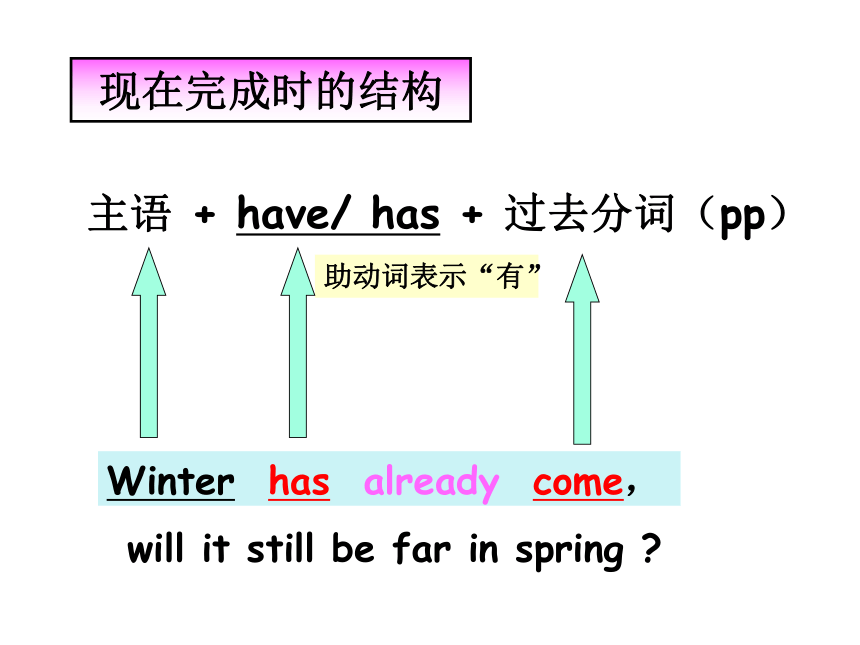
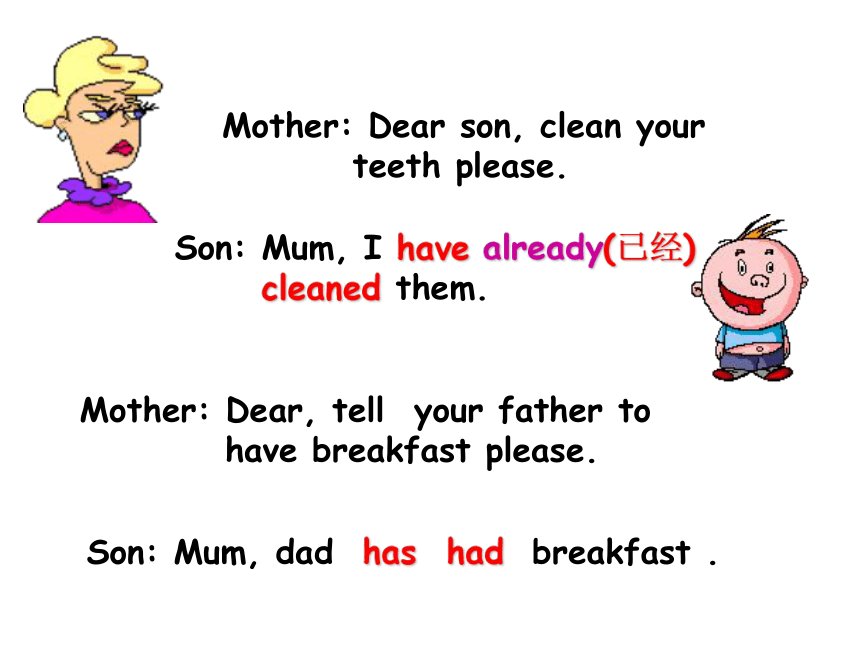
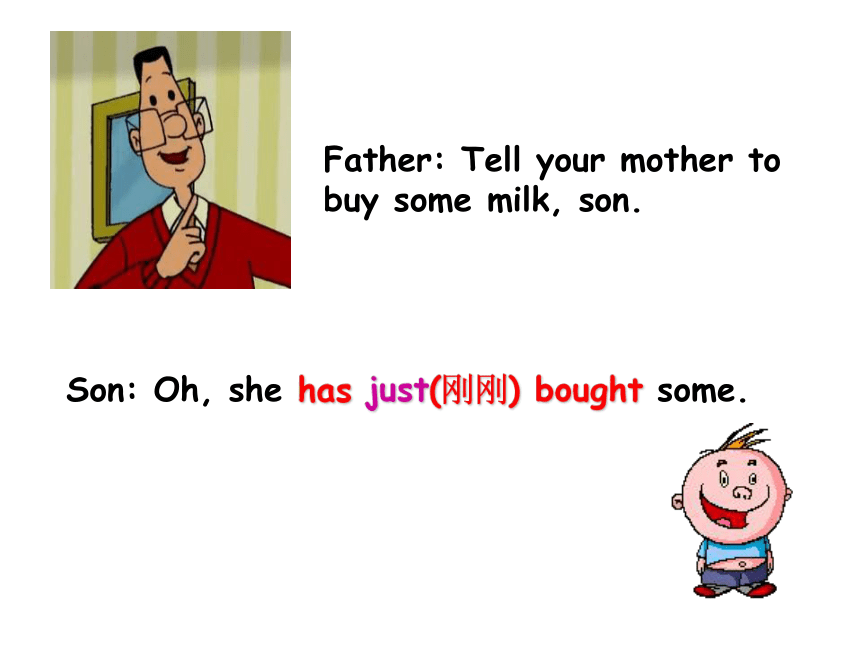
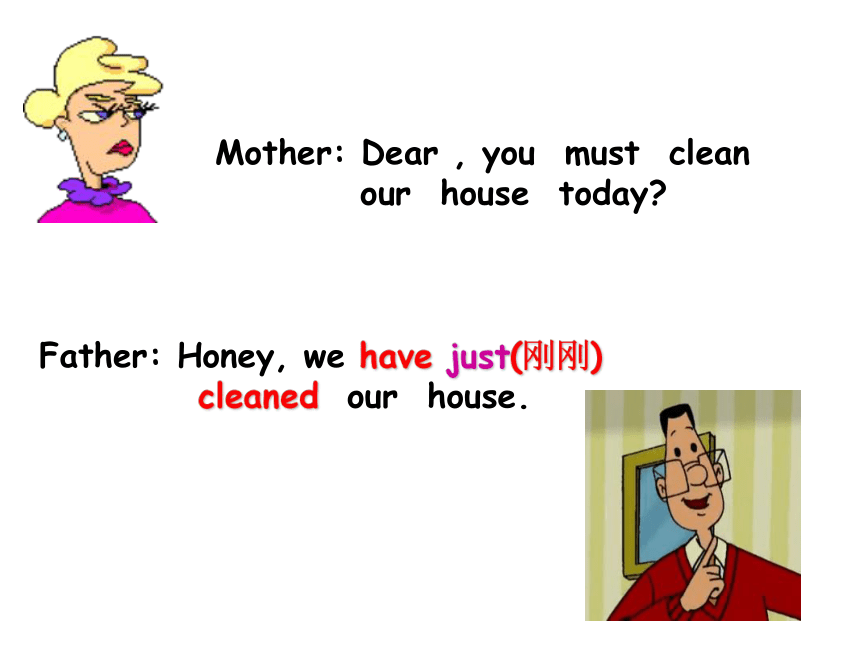
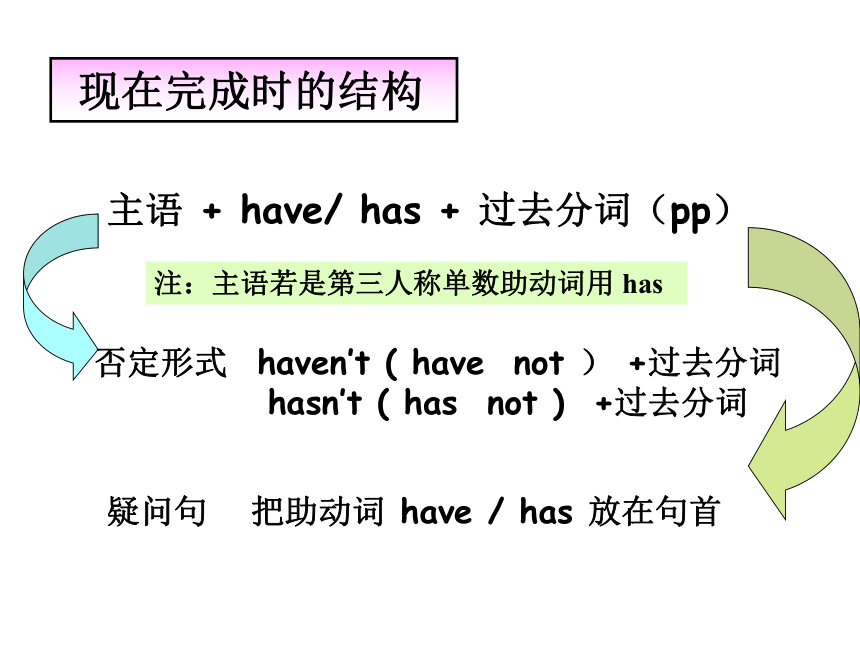
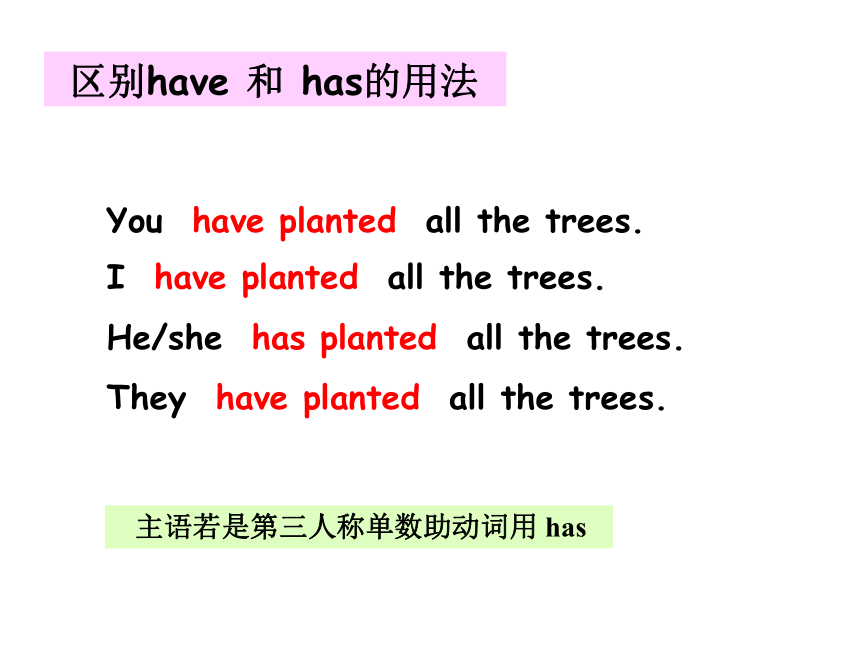
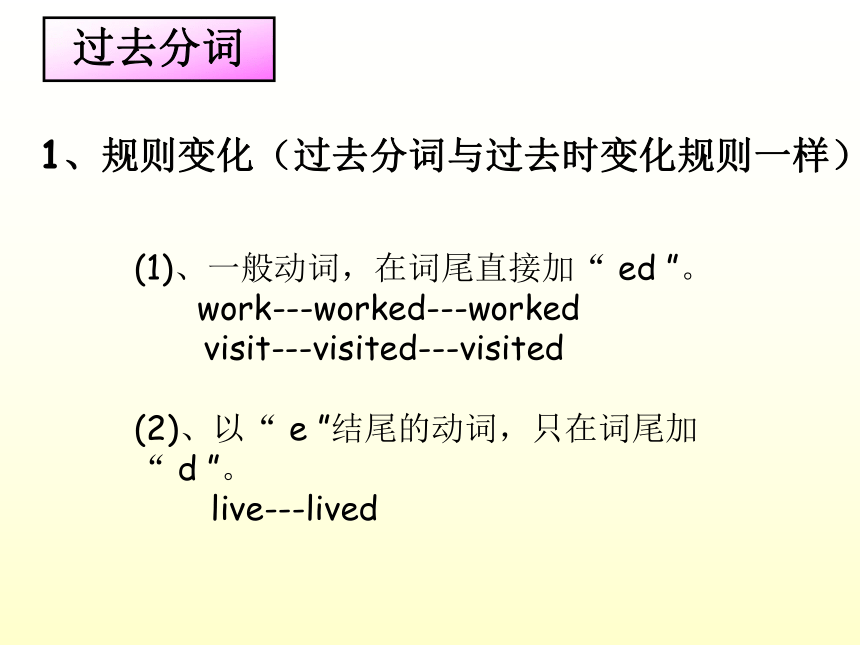
文档简介
课件26张PPT。Winter has already come,
will it still be far in spring ?冬天已经来了,春天还会远吗? Present Perfect Tense
现在完成时
主语 + have/ has + 过去分词(pp)助动词表示“有” 现在完成时的结构Winter has already come,will it still be far in spring ?Mother: Dear son, clean your
teeth please.Son: Mum, I have already(已经)
cleaned them.Mother: Dear, tell your father to
have breakfast please.Son: Mum, dad has had breakfast .Father: Tell your mother to buy some milk, son.Son: Oh, she has just(刚刚) bought some.Mother: Dear , you must clean
our house today?Father: Honey, we have just(刚刚)
cleaned our house.主语 + have/ has + 过去分词(pp)否定形式 haven’t ( have not ) +过去分词
hasn’t ( has not ) +过去分词疑问句 把助动词 have / has 放在句首 现在完成时的结构注:主语若是第三人称单数助动词用 hasYou have planted all the trees.
I have planted all the trees.
He/she has planted all the trees.
They have planted all the trees. 区别have 和 has的用法 主语若是第三人称单数助动词用 has1、规则变化(过去分词与过去时变化规则一样)(1)、一般动词,在词尾直接加“ ed ”。
work---worked---worked
visit---visited---visited
(2)、以“ e ”结尾的动词,只在词尾加“ d ”。
live---lived 过去分词(3)、以“辅音字母 + y ”结尾的动词,将 “y” 变为 “i”,
再加“ ed ”。 ,
study---studied---studied
cry---cried---cried
(4)、重读闭音节结尾,末尾只有一个辅音字母,
先双写该辅音字母,再加“ ed ”。
stop---stopped---stopped
drop---dropped--dropped 2、不规则变化
(过去分词与不规则动词的过去式形式一样)have—had—had
spend —spent—spent
make—made—maden
say—said—said
find—found—found
hear—heard—heard 3、不规则变化
(过去分词与过去式形式不一样)take—took—taken
speak —spoke—spoken
sing—sang—sung
drive—drove—driven
be—was/were—been
go—went—gone 4、不规则变化
(过去分词,过去式与动词原形一样)cut—cut—cut
put —put—put
let—let—let
read—read—read
1) 表示到现在为止已经完成或刚刚完成的动作。
Now we have planted all the trees.
He has just come back.
They have built many buildings in this city. 现在完成时的用法2) 表示过去发生的动作,强调结果或对现在的影响。
Someone has broken the window. (窗户现在是坏的)
I have already lost the key. (我现在没有钥匙)
I haven’t read that book yet . (不了解书的内容)
I have just cleaned my hands. (手是干净的)常与already(已经), yet(已经), just(刚刚),ever(曾经)等词连用. already: 常用于肯定句中.
yet: 常用于否定句,疑问句尾. 3) 表示从过去开始并持续到现在的动作或状态,常与包括现在在内的一段时间的状语连用。
She has learned English for 5 years.
He has lived in Beijing since he was born .
Has he lived in Shenzhen for 4 years? 常与for, since引导的时间短语或从句连用. for+ 时间段
since+时间点 , since+ 句子注:并非所有for作为时间状语的句子都用现在完成时I worked here for more than twenty years.
(我现在已经不在这里工作了)
I have worked here for more than twenty years.
(现在我仍在这里工作)since: (自…以来)
1)since+时间点
He?has?stayed?here?since?5?o’clock.
2)since+ 时间段+ ago
He?has?stayed?here?since?5?hours?ago.
3)since+ 从句
She?has?taught?English?since?he?came?here.
for: (长达)
for+ 时间段
He has kept the book for 2 weeks.since , for 的用法:用for 或since填空Mr. Brown has had his TV ______ 15 years.
I’ve taken driving lessons _______last month.
My sister has had her cell phone ______a month .
My friends haven’t visited me ______my birthday.
We haven’t used our car _____ a long time .
She hasn’t had a good cup of coffee _____years.
Tom has worn glasses _______he was 7 years old. for since forsinceforforsince注意: 瞬间动词不能和时间段连用. method 1: 动作 die be over leaveborrow/buy arrive begin end/finish join marrykeep/had be away be here be on(上演) be married be in be dead他的爷爷已经去世2年了。
Nick 参军3年了.
他离开深圳好长时间了。
这本书我已借了4个月了. His grandpa has been dead for 2 years. Nick has been in the army for 3 years. He has been away from Shenzhen for a long time. I have kept the book for 4 months. method 2: It is + 时间段 since + 一般过去时的句子.他的爷爷已经去世2年了。
Nick 参军3年了.
他离开深圳好长时间了。
这本书我已借了4个月了. It is 2 years since his grandpa died. It is 3 years since Nick joined the army. It is a long time since he left Shenzhen. It is 4 months since I borrowed the book . 辨析 have been to和 have gone toMy father has gone to Shanghai for a meeting.
他(已经)去了上海。My father has been to Shanghai for a meeting.
他(曾经)去了上海。 She has been to China .
她(曾经)去过中国。(人已经回来了)have been to someplace. 曾经去过某地,已经回来.
has gone to someplace.某人去了某地,还没有回来. She has gone to China last week.
上周她去了上海 。(人可能回来了也可能没回来)用have/has been to, have/has gone to填空:
1.—Where is your brother?
—He ____________ the shop. He’ll be back soon.
2. — ______ you ever _________ to America?
—Yes, I ___________ New York twice.
3. —Here you are at last! Where _____ you _____?
—I _____________ London.
4. —David _____________Australia.
—I’m sure he’s already arrived.
5. —Is Benny here?
—No, he __________ the school library. He left
five minutes ago.has gone toHave been tohave been tohave beenhave been tohas gone tohas gone toTHE END
will it still be far in spring ?冬天已经来了,春天还会远吗? Present Perfect Tense
现在完成时
主语 + have/ has + 过去分词(pp)助动词表示“有” 现在完成时的结构Winter has already come,will it still be far in spring ?Mother: Dear son, clean your
teeth please.Son: Mum, I have already(已经)
cleaned them.Mother: Dear, tell your father to
have breakfast please.Son: Mum, dad has had breakfast .Father: Tell your mother to buy some milk, son.Son: Oh, she has just(刚刚) bought some.Mother: Dear , you must clean
our house today?Father: Honey, we have just(刚刚)
cleaned our house.主语 + have/ has + 过去分词(pp)否定形式 haven’t ( have not ) +过去分词
hasn’t ( has not ) +过去分词疑问句 把助动词 have / has 放在句首 现在完成时的结构注:主语若是第三人称单数助动词用 hasYou have planted all the trees.
I have planted all the trees.
He/she has planted all the trees.
They have planted all the trees. 区别have 和 has的用法 主语若是第三人称单数助动词用 has1、规则变化(过去分词与过去时变化规则一样)(1)、一般动词,在词尾直接加“ ed ”。
work---worked---worked
visit---visited---visited
(2)、以“ e ”结尾的动词,只在词尾加“ d ”。
live---lived 过去分词(3)、以“辅音字母 + y ”结尾的动词,将 “y” 变为 “i”,
再加“ ed ”。 ,
study---studied---studied
cry---cried---cried
(4)、重读闭音节结尾,末尾只有一个辅音字母,
先双写该辅音字母,再加“ ed ”。
stop---stopped---stopped
drop---dropped--dropped 2、不规则变化
(过去分词与不规则动词的过去式形式一样)have—had—had
spend —spent—spent
make—made—maden
say—said—said
find—found—found
hear—heard—heard 3、不规则变化
(过去分词与过去式形式不一样)take—took—taken
speak —spoke—spoken
sing—sang—sung
drive—drove—driven
be—was/were—been
go—went—gone 4、不规则变化
(过去分词,过去式与动词原形一样)cut—cut—cut
put —put—put
let—let—let
read—read—read
1) 表示到现在为止已经完成或刚刚完成的动作。
Now we have planted all the trees.
He has just come back.
They have built many buildings in this city. 现在完成时的用法2) 表示过去发生的动作,强调结果或对现在的影响。
Someone has broken the window. (窗户现在是坏的)
I have already lost the key. (我现在没有钥匙)
I haven’t read that book yet . (不了解书的内容)
I have just cleaned my hands. (手是干净的)常与already(已经), yet(已经), just(刚刚),ever(曾经)等词连用. already: 常用于肯定句中.
yet: 常用于否定句,疑问句尾. 3) 表示从过去开始并持续到现在的动作或状态,常与包括现在在内的一段时间的状语连用。
She has learned English for 5 years.
He has lived in Beijing since he was born .
Has he lived in Shenzhen for 4 years? 常与for, since引导的时间短语或从句连用. for+ 时间段
since+时间点 , since+ 句子注:并非所有for作为时间状语的句子都用现在完成时I worked here for more than twenty years.
(我现在已经不在这里工作了)
I have worked here for more than twenty years.
(现在我仍在这里工作)since: (自…以来)
1)since+时间点
He?has?stayed?here?since?5?o’clock.
2)since+ 时间段+ ago
He?has?stayed?here?since?5?hours?ago.
3)since+ 从句
She?has?taught?English?since?he?came?here.
for: (长达)
for+ 时间段
He has kept the book for 2 weeks.since , for 的用法:用for 或since填空Mr. Brown has had his TV ______ 15 years.
I’ve taken driving lessons _______last month.
My sister has had her cell phone ______a month .
My friends haven’t visited me ______my birthday.
We haven’t used our car _____ a long time .
She hasn’t had a good cup of coffee _____years.
Tom has worn glasses _______he was 7 years old. for since forsinceforforsince注意: 瞬间动词不能和时间段连用. method 1: 动作 die be over leaveborrow/buy arrive begin end/finish join marrykeep/had be away be here be on(上演) be married be in be dead他的爷爷已经去世2年了。
Nick 参军3年了.
他离开深圳好长时间了。
这本书我已借了4个月了. His grandpa has been dead for 2 years. Nick has been in the army for 3 years. He has been away from Shenzhen for a long time. I have kept the book for 4 months. method 2: It is + 时间段 since + 一般过去时的句子.他的爷爷已经去世2年了。
Nick 参军3年了.
他离开深圳好长时间了。
这本书我已借了4个月了. It is 2 years since his grandpa died. It is 3 years since Nick joined the army. It is a long time since he left Shenzhen. It is 4 months since I borrowed the book . 辨析 have been to和 have gone toMy father has gone to Shanghai for a meeting.
他(已经)去了上海。My father has been to Shanghai for a meeting.
他(曾经)去了上海。 She has been to China .
她(曾经)去过中国。(人已经回来了)have been to someplace. 曾经去过某地,已经回来.
has gone to someplace.某人去了某地,还没有回来. She has gone to China last week.
上周她去了上海 。(人可能回来了也可能没回来)用have/has been to, have/has gone to填空:
1.—Where is your brother?
—He ____________ the shop. He’ll be back soon.
2. — ______ you ever _________ to America?
—Yes, I ___________ New York twice.
3. —Here you are at last! Where _____ you _____?
—I _____________ London.
4. —David _____________Australia.
—I’m sure he’s already arrived.
5. —Is Benny here?
—No, he __________ the school library. He left
five minutes ago.has gone toHave been tohave been tohave beenhave been tohas gone tohas gone toTHE END
同课章节目录
- Module 1 Feelings and impressions
- Unit 1 It smells delicious.
- Unit 2 I feel nervous when I speak Chinese .
- Unit 3 Language in use
- Module 2 Experiences
- Unit 1 I've also entered lots of speaking competi
- Unit 2 They have seen the Pyramids.
- Unit 3 Language in use
- Module 3 Journey to space
- Unit 1 Has it arrived yet?
- Unit 2 We have not found life on any other planet
- Unit 3 Language in use
- Module 4 Seeing the docto
- Unit 1 I haven't done much exercise since I got m
- Unit 2 We have played football for a year now
- Unit 3 Language in use
- Module 5 Cartoons
- Unit 1 It's time to watch a cartoon.
- Unit 2 Tintin has been popular for over eighty yea
- Unit 3 Language in use
- Revision module A
- Module 6 Hobbies
- Unit 1 Do you collect anything ?
- Unit 2 Hobbies can make you grow as a person.
- Unit 3 Language in use
- Module 7 Summer in Los Angeles
- Unit 1 Please write to me and send me some photos
- Unit 2 Fill out a form and come to learn English
- Unit 3 Language in use
- Module 8 Time off
- Unit 1 I can hardly believe we are in the city ce
- Unit 2 We thought somebody was moving about
- Unit 3 Language in use
- Module 9 Friendship
- Unit 1 Could I ask if you've mentioned this to he
- Unit 2 I believe that the world is what you think
- Unit 3 Language in use
- Module 10 On the radio
- Unit 1 I hope that you can join us one day
- Unit 2 It seemed that they were speaking to me in
- Unit 3 Language in use
- Revision module B
